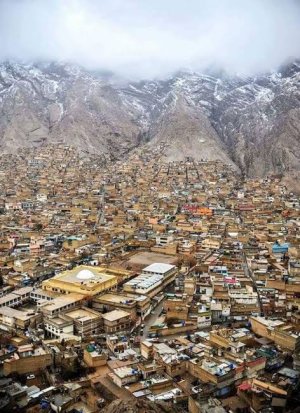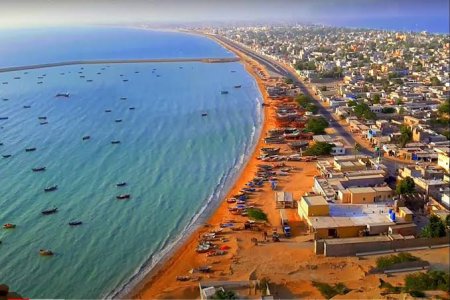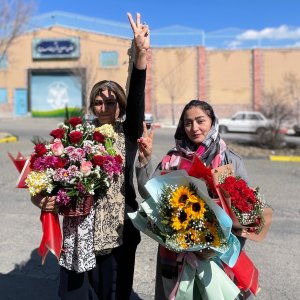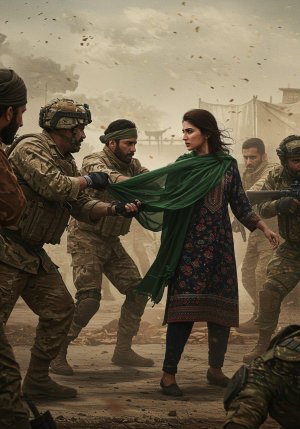A life spent waiting - and searching rows of unclaimed bodies
Saira Baloch was 15 when she stepped into a morgue for the first time.
All she heard in the dimly-lit room were sobs, whispered prayers and shuffling feet. The first body she saw was a man who appeared to have been tortured.
His eyes were missing, his teeth had been pulled out and there were burn marks on his chest.
"I couldn't look at the other bodies. I walked out," she recalled.
But she was relieved. It wasn't her brother - a police officer who had been missing for nearly a year since he was arrested in 2018 in a counter-terrorism operation in Balochistan, one of Pakistan's most restive regions.
Inside the morgue, others continued their desperate search, scanning rows of unclaimed corpses. Saira would soon adopt this grim routine, revisiting one morgue after another. They were all the same: tube lights flickering, the air thick with the stench of decay and antiseptic.
On every visit, she hoped she would not find what she was looking for - seven years on, she still hasn't.
Activists say thousands of ethnic Baloch people have been disappeared by Pakistan's security forces in the last two decades - allegedly detained without due legal process, or abducted, tortured and killed in operations against a decades-old separatist insurgency.
The Pakistan government denies the allegations, insisting that many of the missing have joined separatist groups or fled the country.
Some return after years, traumatised and broken - but many never come back. Others are found in unmarked graves that have appeared across Balochistan, their bodies so disfigured they cannot be identified.
And then there are the women across generations whose lives are being defined by waiting.
Young and old, they take part in protests, their faces lined with grief, holding up fading photographs of men no longer in their lives. When the BBC met them at their homes, they offered us black tea - Sulemani chai - in chipped cups as they spoke in voices worn down by sorrow.
Many of them insist their fathers, brothers and sons are innocent and have been targeted for speaking out against state policies or were taken as a form of collective punishment.
Saira is one of them.
She says she started going to protests after asking the police and pleading with politicians yielded no answers about her brother's whereabouts.
Muhammad Asif Baloch was arrested in August 2018 along with 10 others in Nushki, a city along the border with Afghanistan. His family found out when they saw him on TV the next day, looking scared and dishevelled.
Authorities said the men were "terrorists fleeing to Afghanistan". Muhammad's family said he was having a picnic with friends.
Saira says Muhammad was her "best friend", funny and always cheerful - "My mother worries that she's forgetting his smile."
The day he went missing, Saira had aced a school exam and was excited to tell her brother, her "biggest supporter". Muhammad had encouraged her to attend universty in Quetta, the provincial capital.
"I didn't know back then that the first time I'd go to Quetta, it would be for a protest demanding his release," Saira says.
Three of the men who were detained along with her brother were released in 2021, but they have not spoken about what happened.
Muhammad never came home.
Lonely road into barren lands
The journey into Balochistan, in Pakistan's south-west, feels like you are stepping into another world.
It is vast - covering about 44% of the country, the largest of Pakistan's provinces - and the land is rich with gas, coal, copper and gold. It stretches along the Arabian Sea, across the water from places like Dubai, which has risen from the sands into glittering, monied skyscrapers.
But Balochistan remains stuck in time. Access to many parts is restricted for security reasons and foreign journalists are often denied access.
It's also difficult to travel around. The roads are long and lonely, cutting through barren hills and desert. As the infrastructure thins out the further you travel, roads are replaced by dirt tracks created by the few vehicles that pass.
Electricity is sporadic, water even scarcer. Schools and hospitals are dismal.
In the markets, men sit outside mud shops waiting for customers who rarely come. Boys, who elsewhere in Pakistan may dream of a career, only talk of escape: fleeing to Karachi, to the Gulf, to anywhere that offers a way out of this slow suffocation.
Balochistan became a part of Pakistan in 1948, in the upheaval that followed the partition of British India - and in spite of opposition from some influential tribal leaders, who sought an independent state.
Some of the resistance turned militant and, over the years, it has been stoked by accusations that Pakistan has exploited the resource-rich region without investing in its development.
Militant groups like the Balochistan Liberation Army (BLA), designated a terrorist group by Pakistan and other nations, have intensified their attacks: bombings, assassinations and ambushes against security forces have become more frequent.
Earlier this month, the BLA hijacked a train in Bolan Pass, seizing hundreds of passengers. They demanded the release of missing people in Balochistan in return for freeing hostages.
The siege lasted over 30 hours. According to authorities, 33 BLA militants, 21 civilian hostages and four military personnel were killed. But conflicting figures suggest many passengers remain unaccounted for.
The disappearances in the province are widely believed to be part of Islamabad's strategy to crush the insurgency - but also to suppress dissent, weaken nationalist sentiment and support for an independent Balochistan.
Many of the missing are suspected members or sympathisers of Baloch nationalist groups that demand more autonomy or independence. But a significant number are ordinary people with no known political affiliations.
Balochistan's Chief Minister Sarfaraz Bugti told the BBC that enforced disappearances are an issue but dismissed the idea that they were happening on a large scale as "systematic propaganda".
"Every child in Balochistan has been made to hear 'missing persons, missing persons'. But who will determine who disappeared whom?
"Self-disappearances exist too. How can I prove if someone was taken by intelligence agencies, police, FC, or anyone else or me or you?"
Pakistan's military spokesperson Lieutenant General Ahmed Sharif recently said in a press conference that the "state is solving the issue of missing persons in a systematic manner".
He repeated the official statistic often shared by the government - of the more than 2,900 cases of enforced disappearances reported from Balochistan since 2011, 80% had been resolved.
Activists put the figure higher - at around 7,000 – but there is no single reliable source of data and no way to verify either side's claims.
'Silence is not an option'
Women like Jannat Bibi refuse to accept the official number.
She continues to search for her son, Nazar Muhammad, who she claims was taken in 2012 while eating breakfast at a hotel.
"I went everywhere looking for him. I even went to Islamabad," she says. "All I got were beatings and rejection."
The 70-year-old lives in a small mud house on the outskirts of Quetta, not far from a symbolic graveyard dedicated to the missing.
Jannat, who runs a tiny shop selling biscuits and milk cartons, often can't afford the bus fare to attend protests demanding information about the missing. But she borrows what she can so she can keep going.
"Silence is not an option," she says.
Most of these men - including those whose families we spoke to - disappeared after 2006.
That was the year a key Baloch leader, Nawab Akbar Bugti, was killed in a military operation, leading to a rise in anti-state protests and armed insurgent activities.
The government cracked down in response - enforced disappearances increased, as did the number of bodies found on the streets.
In 2014, mass graves of missing people were discovered in Tootak – a small town near the city of Khuzdar, where Saira lives, 275km (170 miles) south of Quetta.
The bodies were disfigured beyond identification. The images from Tootak shook the country - but the horror was no stranger to people in Balochistan.
Mahrang Baloch's father, a famous nationalist leader who fought for Baloch rights, had disappeared in early 2009. Abdul Gaffar Langove had worked for the Pakistani government but left the job to advocate for what he believed would be a safer Balochistan.
Three years later Mahrang received a phone call that his body had been found in Lasbela district in the south of the province.
"When my father's body arrived, he was wearing the same clothes, now torn. He had been badly tortured," she says. For five years, she had nightmares about his final days. She visited his grave "to convince myself that he was no longer alive and that he was not being tortured".
She hugged his grave "hoping to feel him, but it didn't happen".
When he was arrested, Mahrang used to write him letters - "lots of letters and I would draw greeting cards and send them to him on Eid". But he returned the cards, saying his prison cell was no place for such "beautiful" cards. He wanted her to keep them at home.
"I still miss his hugs," she says.
After her father's death, Mahrang says, her family's world "collapsed".
And then in 2017, her brother was picked up by security forces, according to the family, and detained for nearly three months.
"It was terrifying. I made my mother believe that what happened to my father wouldn't happen to my brother. But it did," Mahrang says. "I was scared of looking at my phone, because it might be news of my brother's body being found somewhere."
She says her mother and she found strength in each other: "Our tiny house was our safest place, where we would sometimes sit and cry for hours. But outside, we were two strong women who couldn't be crushed."
It was then that Mahrang decided to fight against enforced disappearances and extrajudicial killings. Today, the 32-year-old leads the protest movement despite death threats, legal cases and travel bans.
"We want the right to live on our own land without persecution. We want our resources, our rights. We want this rule of fear and violence to end."
Mahrang warns that enforced disappearances fuel more resistance, rather than silence it.
"They think dumping bodies will end this. But how can anyone forget losing their loved one this way? No human can endure this."
She demands institutional reforms, ensuring that no mother has to send her child away in fear. "We don't want our children growing up in protest camps. Is that too much to ask?"
Mahrang was arrested on Saturday morning, a few weeks after her interview with the BBC.
She was leading a protest in Quetta after 13 unclaimed bodies - feared to be missing persons - were buried in the city. Authorities claimed they were militants killed after the Bolan Pass train hijacking, though this could not be independently verified.
Earlier Mahrang had said: "I could be arrested anytime. But I don't fear it. This is nothing new for us."
And even as she fights for the future she wants, a new generation is already on the streets.
Masooma, 10, clutches her school bag tightly as she weaves through the crowd of protesters, her eyes scanning every face, searching for one that looks like her father's.
"Once, I saw a man and thought he was my father. I ran to him and then realised he was someone else," she says.
"Everyone's father comes home after work. I have never found mine."
Masooma was just three months old when security forces allegedly took her father away during a late-night raid in Quetta.
Her mother was told he would return in a few hours. He never did.
Today, Masooma spends more time at protests than in the classroom. Her father's photograph is always with her, tucked safely in her school bag.
Before every lesson begins, she takes it out and looks at it.
"I always wonder if my father will come home today."
She stands outside the protest camp, chanting slogans with the others, her small frame lost in the crowd of grieving families.
As the protest comes to an end she sits cross-legged on a thin mat in a quiet corner. The noise of slogans and traffic fades as she pulls out her folded letters - letters she has written but could never send.
Her fingers tremble as she smooths out the creases, and in a fumbling, uncertain voice, she begins to read them.
"Dear Baba Jan, when will you come back? Whenever I eat or drink water, I miss you. Baba, where are you? I miss you so much. I am alone. Without you, I cannot sleep. I just want to meet you and see your face."
Source: BBC























